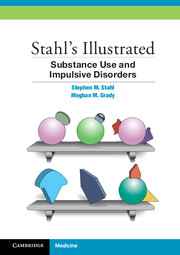Book contents
- Frontmatter
- Preface
- Contents
- CME Information
- Objectives
- Chapter 1 Substance Use and Addiction: An Overview
- Chapter 2 The Neurobiology of Reward and Drug Addiction
- Chapter 3 Alcohol
- Chapter 4 Opioids
- Chapter 5 Nicotine
- Chapter 6 Stimulants
- Chapter 7 Marijuana
- Chapter 8 Other Drugs of Abuse
- Chapter 9 Psychosocial Treatment for Substance Use Disorders
- Chapter 10 Disorders of Impulsivity and Compulsivity
- Summary
- Abbreviations
- References
- Index
- CME: Posttest and Certificate
Chapter 2 - The Neurobiology of Reward and Drug Addiction
Published online by Cambridge University Press: 05 February 2013
- Frontmatter
- Preface
- Contents
- CME Information
- Objectives
- Chapter 1 Substance Use and Addiction: An Overview
- Chapter 2 The Neurobiology of Reward and Drug Addiction
- Chapter 3 Alcohol
- Chapter 4 Opioids
- Chapter 5 Nicotine
- Chapter 6 Stimulants
- Chapter 7 Marijuana
- Chapter 8 Other Drugs of Abuse
- Chapter 9 Psychosocial Treatment for Substance Use Disorders
- Chapter 10 Disorders of Impulsivity and Compulsivity
- Summary
- Abbreviations
- References
- Index
- CME: Posttest and Certificate
Summary
The goal of neurobiological drug abuse research is to identify the mechanisms that mediate the progression from occasional and impulsive drug use to compulsive drug use, as well as how these mechanisms contribute to the high risk for relapse even after prolonged abstinence. It is known that chronic drug use affects not only dopamine and the reward circuit, but also other neurotransmitters and circuits involved in memory, motivation, executive function, and stress. Thus, the mechanisms by which addiction may develop are widespread, and although research is plentiful and rapidly expanding, many unanswered questions still remain.
This chapter covers what is best understood about the neurobiology of the reward system and the acute effects of drug exposure; chronic drug exposure and the progression to addiction; and the neurobiology of tolerance, withdrawal, and the risk for relapse.
The rate of drug uptake is subject to the route of administration, with intravenous administration and inhalation producing the fastest drug uptake, followed by snorting. In addition, different drugs of abuse have different “reward values” (i.e., different rates at which they increase DA) based on their individual mechanisms of action.
The reflective reward system is built and maintained over time based on various influences, including neurodevelopment, genetics, peer pressure, the learning of social rules, and the learning of the benefits of suppressing current pleasure for more valuable future gain. When fully developed and functioning properly, the reflective reward system can shape the final output of the reward system into long-term beneficial goal-directed behaviors.
(A) When drug anticipation occurs, (1) this signals an impulsive choice (2) to the VTA to release dopamine in the nucleus accumbens (3), which in turn produces output to engage in behavior that leads to drug ingestion again. In the prefrontal cortex, the orbitofrontal cortex signals drug-induced cravings and thus supports the “vote” for drug ingestion (4). The dorsolateral prefrontal cortex interprets the various signals and, showing cognitive flexibility, decides whether to take the action of drug ingestion (5).
(B) If the reflective reward system (prefrontal circuitry) is activated (shown here by the prefrontal neurons turning red), this can prevent impulses (temptation) from being expressed as behavior.
- Type
- Chapter
- Information
- Publisher: Cambridge University PressPrint publication year: 2012

